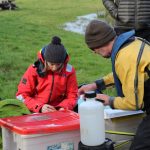
The project, which provides vital research on rapidly declining salmon and sea trout (Salmonid) populations, is set to receive a €5.4 million contribution from the EU’s Interreg France (Channel) England programme.
SAMARCH will focus on the behaviour and mortality of salmonid populations in estuaries and coastal waters to determine where they are dying. It will also use DNA analysis to map areas in the channel that are important for sea trout and to determine the sex ratio of salmonids to improve the tools used by the regulatory bodies in England and France to manage their salmon stocks.
Genoveva Esteban, Professor at Bournemouth University, said: “SAMARCH is a marvellous opportunity for students to carry out work placements and research projects here in the UK and in France.
“This partnership will also facilitate cross-border student exchanges and knowledge – not just for the benefit of all partners, but of society in general.”
This project will use state-of-the-art fish monitoring facilities on five rivers across the south of England and northern France – including the Freshwater Biological Association’s River Laboratory on the River Frome in Dorset.
The knowledge gathered during the five-year project, which runs to 2022, will be used to update regulations in both France and England on the management of salmonids in estuaries and coastal waters.
If implemented, this could lead to a 6% to 9% increase in adult salmonid populations in the channel area.
Atlantic salmon and sea trout populations have declined by around 70% since the 1970s; they play a major role in coastal and river ecosystems and have a considerable economic importance through angling in Europe estimated to be worth as much as €1.2 billion.
Dylan Roberts, head of fisheries at GWCT and project manager, said: “Until recently, management has focused largely on addressing issues in fresh water; however we know that more than 90% of salmon smolts that leave our rivers for their feeding grounds in the north Atlantic die at sea.
“Researching salmon in the sea has always been technically difficult, but recent developments in fish tracking technology, DNA methodologies and advances in data analysis techniques now enables us to quantify what proportion of this mortality that occurs in the estuary and coastal areas, their movements through these areas.
“SAMARCH will also sharpen the tools used to manage salmonid stocks and adjust our management strategies accordingly. We are delighted that the Interrreg programme has decided to support SAMARCH and we look forward to working with our partners over the next five years.”
 SAMARCH (SAlmoid MAnagement Round the CHannel) team brave the cold to find and tag sea trout
SAMARCH (SAlmoid MAnagement Round the CHannel) team brave the cold to find and tag sea trout Interreg France (Channel) England has introduced new website
Interreg France (Channel) England has introduced new website Interreg (Channel) Event on Flooding – Save the Date
Interreg (Channel) Event on Flooding – Save the Date BU staff, students and alumni celebrate the launch of Events Management: An International Approach
BU staff, students and alumni celebrate the launch of Events Management: An International Approach










 Second NIHR MIHERC meeting in Bournemouth this week
Second NIHR MIHERC meeting in Bournemouth this week Dr. Ashraf cited on ‘Modest Fashion’ in The Guardian
Dr. Ashraf cited on ‘Modest Fashion’ in The Guardian NIHR-funded research launches website
NIHR-funded research launches website MSCA Postdoctoral Fellowships 2025 Call
MSCA Postdoctoral Fellowships 2025 Call ERC Advanced Grant 2025 Webinar
ERC Advanced Grant 2025 Webinar Horizon Europe Work Programme 2025 Published
Horizon Europe Work Programme 2025 Published Horizon Europe 2025 Work Programme pre-Published
Horizon Europe 2025 Work Programme pre-Published Update on UKRO services
Update on UKRO services European research project exploring use of ‘virtual twins’ to better manage metabolic associated fatty liver disease
European research project exploring use of ‘virtual twins’ to better manage metabolic associated fatty liver disease